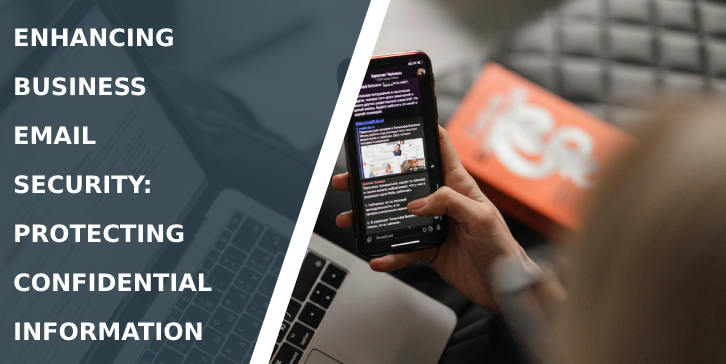The Importance of Email Security in Business
Email has become the backbone of modern business communication. It is a conduit for sharing critical information, sensitive data, and confidential documents. The importance of email security in business cannot be overstated for several compelling reasons:
- Confidentiality: Business emails often contain sensitive data, such as financial information, customer details, and proprietary strategies. Ensuring the confidentiality of this data is essential to protect your business and maintain trust with clients and partners.
- Integrity: Email security safeguards the integrity of your messages. It ensures that emails remain unchanged during transmission, preventing unauthorized alterations or tampering.
- Authentication: Email security measures help verify the sender’s identity and confirm that the email hasn’t been spoofed. This authentication is crucial for preventing phishing attacks and ensuring the legitimacy of communications.
- Compliance: Many industries and regions have regulations and compliance standards (e.g., GDPR, HIPAA) that require the secure handling of sensitive information. Email security helps your business meet these legal obligations.
- Reputation: A breach in email security can harm your business’s reputation. Clients and partners expect their information to be handled carefully, and a security lapse can erode trust.
- Financial Protection: Cyberattacks and email security breaches can lead to financial losses, including legal fees, fines, and potential lawsuits. A robust email security strategy can protect your business’s economic interests.
The following sections will delve deeper into the common email security threats businesses face and the strategies to mitigate these risks. Understanding the significance of email security is the first step in fortifying your business against cyber threats.
Common Email Security Threats

When it comes to email security, businesses must be vigilant in identifying and addressing various threats that can compromise the confidentiality and integrity of their communications. This section outlines the most prevalent email security threats:
Phishing Attacks
Phishing attacks are deceptive attempts to trick individuals into revealing sensitive information such as login credentials, financial data, or personal details. These attacks often involve emails that impersonate trusted entities, urging recipients to click on malicious links or download harmful attachments.
Malware and Ransomware
Malware, short for “malicious software,” encompasses various types of software designed to harm or gain unauthorized access to systems. Ransomware is a specific form of malware that encrypts a victim’s files and demands a ransom for their release. Both malware and ransomware can be delivered via email attachments or links.
Data Breaches
Data breaches occur when unauthorized parties gain access to sensitive or confidential information. Email communications can be a vulnerable entry point for cybercriminals seeking to steal valuable data, leading to financial losses, legal ramifications, and damage to a business’s reputation.
Understanding these common email security threats is essential for businesses to implement effective safeguards and protect sensitive information. The following sections will explore strategies and solutions to mitigate these threats and bolster email security.
Strategies for Enhancing Email Security
Securing your business email communications requires a multifaceted approach, including implementing effective strategies to mitigate vulnerabilities. Here are key strategies for enhancing email security:
Strong Password Policies
Enforcing strong password policies is a fundamental step in bolstering email security. Weak passwords are an open invitation to cyberattacks. Encourage employees to create complex passwords that combine uppercase and lowercase letters, numbers, and special characters. Regularly update passwords and consider using password management tools to ensure strong, unique passwords for each account.
Email Encryption
Email encryption is a vital technique to protect the confidentiality of your messages. It involves encoding the content of emails so that only authorized recipients can decipher it. Implement end-to-end email encryption solutions to safeguard sensitive data during transmission. Encryption adds an extra layer of security that prevents unauthorized access to email content.
Two-factor authentication (2FA)
Two-factor authentication (2FA) adds a layer of security to email accounts by requiring users to provide two forms of identification before gaining access. Typically, this involves something the user knows (password) and something they have (a mobile device or authentication app). 2FA significantly reduces the risk of unauthorized access, even if login credentials are compromised.
Employee Training and Awareness
Employees are often the first line of defense against email security threats. Conduct regular training sessions to educate your staff about email security best practices, common phishing tactics, and how to recognize suspicious emails. Encourage a culture of cybersecurity awareness where employees report potential threats promptly.
These strategies form the foundation of a robust email security framework. Businesses can significantly reduce the risk of email-related security incidents by implementing strong password policies, email encryption, and Two-Factor Authentication and fostering employee training and awareness.
Advanced Email Security Solutions

In addition to fundamental email security strategies, advanced solutions provide an extra layer of protection against evolving cyber threats. These solutions are designed to detect and mitigate email security risks proactively. Here are key advanced email security solutions:
Email Filtering and Anti-Spam Measures
Email filtering and anti-spam measures are critical components of modern email security. They employ advanced algorithms and machine learning to identify and filter out spam emails, phishing attempts, and malicious attachments before they reach the recipient’s inbox. Effective filtering reduces the likelihood of users interacting with harmful content.
Endpoint Security
Endpoint security protects individual devices (endpoints) such as computers, smartphones, and tablets from security threats. Endpoint security solutions include antivirus software, intrusion detection systems, and firewalls. These tools are vital in identifying and neutralizing malware and ransomware that may be delivered via email.
Secure Email Gateways
Secure email gateways are a safe entry point for incoming and outgoing emails. They provide advanced threat detection, encryption, and data loss prevention (DLP) capabilities. Secure email gateways analyze email content and attachments, blocking or quarantining messages that pose security risks. They also facilitate email encryption to protect sensitive information in transit.
Implementing these advanced email security solutions enhances your organization’s ability to effectively detect and mitigate email-based threats. Businesses can establish a robust email security posture by combining filtering and anti-spam measures, endpoint security, and secure email gateways.
Protecting Confidential Information
Safeguarding confidential information is a paramount concern for businesses. Email is a primary channel for sharing sensitive data, making it essential to implement measures that protect this information from unauthorized access and breaches. Here are key aspects of protecting confidential information:
Data Loss Prevention (DLP)
Data Loss Prevention (DLP) is a proactive approach to identifying, monitoring, and protecting sensitive email data. DLP solutions use content inspection and contextual analysis to prevent the unauthorized sharing or leakage of sensitive information. By defining policies and rules, businesses can automatically avoid transmitting confidential data via email.
Secure File Sharing
Secure file-sharing solutions enable businesses to share files and documents securely through email. These solutions provide encrypted file storage and facilitate fast link-sharing, ensuring only authorized recipients can access sensitive documents. Secure file sharing mitigates the risk of data exposure during email communication.
Compliance and Regulations
Many industries and regions have specific compliance requirements and regulations governing handling confidential information via email. Compliance standards like GDPR, HIPAA, and PCI DSS mandate secure email practices and data protection measures. Businesses must align email security practices with relevant regulations to avoid legal repercussions.
Protecting confidential information in email communication is a matter of security and a legal and ethical responsibility. Data Loss Prevention, secure file sharing, and compliance adherence are crucial components of a comprehensive strategy to safeguard sensitive data.
Employee Role in Email Security
Employees play a pivotal role in maintaining an organization’s robust email security posture. Educating and empowering employees to actively contribute to email security efforts is essential. Here are key aspects of the employee’s role in email security:
Recognizing Phishing Attempts
Phishing attempts are often the initial point of entry for cyberattacks. Employees should be trained to recognize phishing emails and cybercriminals’ tactics to deceive recipients. Common signs of phishing include unusual sender addresses, spelling errors, requests for sensitive information, and urgent language. By identifying phishing attempts, employees can prevent security breaches.
Reporting Suspicious Emails
Encouraging a culture of reporting suspicious emails is crucial. Employees should be aware of the importance of writing any email that appears suspicious or potentially malicious. Reporting mechanisms should be straightforward and well-established within the organization. Rapid reporting allows IT teams to investigate and respond to threats promptly.
Safe Email Practices
Promoting safe email practices among employees is vital for overall email security. Training should include:
- Guidelines on creating strong passwords.
- Avoiding password sharing.
- Do not click on unknown links or download attachments from unverified sources.
- Verifying the authenticity of emails from unfamiliar senders.
Safe email practices reduce the risk of human error, leading to security incidents.
Employees are often the last line of defense against email security threats. Businesses can significantly enhance their overall email security posture by educating employees about recognizing phishing attempts, reporting suspicious emails, and practicing safe email habits.
Fortifying Business Email Security
In the digital age, where email communication is the lifeblood of business operations, fortifying your email security is not merely an option; it’s a necessity. The risks associated with email security breaches, data leaks, and cyberattacks are ever-present and can have far-reaching consequences.
This comprehensive guide has explored the multifaceted landscape of email security, equipping you with the knowledge and tools necessary to protect your organization’s confidential information. From understanding the common email security threats to implementing robust security strategies, you’ve gained insights into the intricate world of email security.
Remember that email security is an ongoing commitment. Cyber threats evolve continuously, requiring businesses to adapt and strengthen their defenses. Regular training, updates to security policies, and staying informed about the latest threats are essential practices in maintaining a secure email environment.
You can fortify your business email security by taking a proactive approach, implementing advanced security solutions, educating your employees, and adhering to compliance standards. Safeguarding confidential information, maintaining the trust of clients and partners, and protecting your organization’s reputation are all outcomes of a robust email security strategy.
As you navigate the ever-changing email security landscape, remember that vigilance and preparedness are your allies. Your commitment to email security will protect your business and ensure the integrity and confidentiality of your communications.
Thank you for embarking on this journey to enhance your business email security. With the knowledge and practices gained from this guide, you are well-prepared to face email security challenges and safeguard your organization’s future.





Comments are closed.